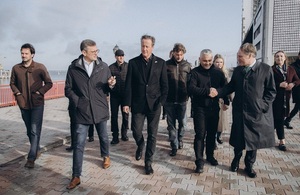Ukraine: Foreign Secretary is first UK minister to visit Odesa
Foreign Secretary David Cameron is the first UK minister to visit Black Sea port city of Odesa since Russia’s full-scale invasion.

Foreign Secretary David Cameron with Dmytro Kuleba, Minister of Foreign Affairs of Ukraine, in Odesa, Ukraine. Photo credit: Ministry of Foreign Affairs of Ukraine.
Foreign Secretary David Cameron has today seen first-hand how Ukraine is pushing back Russian forces in the Black Sea to ensure grain is able to reach the world’s vulnerable.
On the second day of his visit to Ukraine, the Foreign Secretary has travelled to the Black Sea port city of Odesa – he is the first UK government minister to do so since Russia’s full-scale invasion began.
Odesa is at the forefront of Ukraine’s resistance to Russian aggression. In the last three months, Ukraine has made remarkable progress in the Black Sea to drive the Russian Navy eastwards and open critical export corridors for Ukraine’s economy and global food supplies.
Ukraine’s efforts since Russia collapsed the Black Sea Grain Initiative, have allowed 91 ships to export 3.3 million tonnes of agricultural and other cargo.
Foreign Secretary David Cameron said:
As Foreign Secretary, supporting Ukraine against Putin’s aggression is vital, which is why I am pleased to make this my first visit as Secretary of State.
Russia thinks it can wait this war out, and that the West will eventually turn its attention elsewhere. This could not be further from the truth. In my first discussions with President Zelenskyy in my new role, I made clear that the UK and our partners will support Ukraine and its people for as long as it takes for them to achieve victory.
As winter approaches, we continue to stand with the Ukrainian people as they resist Putin’s illegal invasion. In the last three months, they have pushed Russia back in the Black Sea and are opening vital sea trade routes for the Ukrainian economy and global food supplies.
While in Odesa, the Foreign Secretary also announced support to Ukrainians directly impacted by the invasion.
This includes providing essential winter supplies and support for people being evacuated from front line areas. The UK is providing £10 million for Ukraine’s Red Cross Society (URCS) appeal to provide medical supplies to communities directly affected by Russia’s aggression and to support URCS as a first responder.
The UK will also provide more than £7 million to a consortium led by Nonviolent Peaceforce, which is supporting volunteer organisations delivering humanitarian assistance in dangerous front line locations. The UK is also providing an additional £1.4 million to Mercy Corps’ ongoing and live-saving work in Ukraine.
The Black Sea Grain Initiative, which collapsed in July 2023 due to Russia’s withdrawal, was a UN initiative to ensure the exports of Ukrainian food and fertiliser from three key ports in the Black Sea, including Odesa.
Russia’s cynical withdrawal from the programme drove up global food prices and risked the lives of the world’s most vulnerable, with Ukrainian grain exports crucial in ensuring global food security and resilient global markets, keeping prices down and supplementing poor harvests elsewhere.
Since Russia collapsed the Black Sea Grain Initiative (BSGI), Ukraine has worked to open up a Black Sea export corridor for its own economy and for global food supplies. It has pushed back the Russian fleet, protected its coastline and the corridor, and established insurance mechanisms for civilian shipping, all of which have ensured that shipping can re-start. The UK continues to work with Ukraine and other partners to establish routes for Ukrainian exports and to prevent and deter Russian attacks.
Meanwhile, Russian forces have attacked key infrastructure, destroying more than 280,000 tonnes of grain in one month, enough to feed 1.25 million people for a year. These attacks are a brutal and blatant attempt by Russia to choke the Ukrainian economy at a cost to global food supplies.
Background
- the UK strongly condemned Russia’s decision to withdraw from the BSGI in July 2023
- the UK is currently working with Ukraine and other partners to increase the capacity of European overland routes and Danube ports